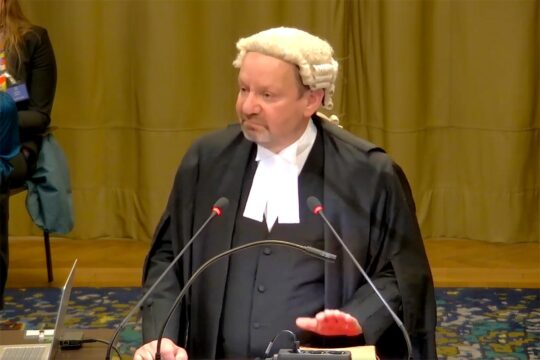Turkey Thursday recalled its envoy to Germany and threatened further measures after the Bundestag described the massacre of Armenians by the former Turkish empire as genocide.
The lower house of parliament massively approved a non-binding resolution on the 1915-16 killings, in a move touching a notoriously raw nerve in Turkish-European relations.
Only one MP voted against and another abstained.
The use of the word "genocide" goes to the heart of a long-running battle for world opinion between Armenia and Turkey.
Armenia has led a decades-long campaign to have the bloodshed characterised as genocide, while Turkey argues that the term is a gross injustice -- it argues that the killings were a collective tragedy in which equal numbers of Turks and Armenians died.
Foreign Minister Edward Nalbandian paid tribute to Germany, singling out its "valuable contribution, not only to the international recognition and condemnation of the Armenian Genocide, but also to the universal fight for the prevention of genocides, crimes against humanity."
But Turkey reacted with fury, recalling its ambassador to Germany for consultations and summoning the German charge d'affaires to a meeting at the foreign ministry in Ankara.
President Recep Tayyip Erdogan warned the motion would "seriously affect" ties. Deputy Prime Minister and government spokesman Numan Kurtulmus called it a "historic mistake" and "null and void".
More than 20 nations, including France and Russia, have already recognised the massacre as a genocide.
But Thursday's vote comes at a particularly awkward time.
Germany and the European Union are relying on Turkey to help stem a record influx of migrants even as tensions are rising between both sides over human rights and other issues.
- Healing old wounds -
The resolution, put forward by the ruling left-right coalition and the opposition Greens, is entitled "Remembrance and commemoration of the genocide of Armenians and other Christian minorities in 1915 and 1916".
The text carries the contentious word throughout and also puts partial blame on the German Empire, then allied with Turkey's Ottoman empire and which failed to prevent the atrocities.
In the public gallery of the Bundestag, onlookers including members of the Armenian community held up banners saying "thank you" when the result of the vote was announced to applause.
Acknowledging Turkey's fury, German political leaders argued however that a clear recognition of historical facts was a key step to healing old wounds.
"We are not looking to put Turkey in the dock. Instead, this is about making clear that taking responsibility for the past is indispensible for reconciliation," said Franz Josef Jung, speaking for Chancellor Angela Merkel's Christian Democrats.
But Ankara was not appeased, and Erdogan had telephoned Merkel over the text ahead of the vote.
Merkel backed the resolution, her spokeswoman said, even though she did not attend the vote due to other official engagements.
Sidestepping a question on the Bundestag decision, Merkel said Thursday at a press conference with NATO chief Jens Stoltenberg that her government will "do everything to foster dialogue between Armenia and Turkey".
- 'Partial responsibility' -
Berlin had until now not taken a clear position on the massacre, and President Joachim Gauck had been the highest-ranking German official who used the term of genocide.
His speech last year during commemorations of the 100th anniversary of the killings had drawn fire from Turkey, but was also rejected by German Foreign Minister Frank-Walter Steinmeier.
Steinmeier has said he hopes the Bundestag resolution will not derail efforts to reconcile Turkey and Armenia.
The issue is particularly sensitive in Germany, which has special ties with Ankara not least due to its three-million-strong ethnic Turkish population which settled following a massive "guest worker" programme in the 1960s and 1970s.
Revealing the pressure that lawmakers came under over the vote, parliament speaker Norbert Lammert said that "many threats were sent to colleagues, particularly those with Turkish background, including death threats".
Armenians say up to 1.5 million of their kin were killed between 1915 and 1917 as the Ottoman Empire was falling apart.
But modern Turkey -- the successor state to the Ottoman Empire -- says 300,000 to 500,000 Armenians and as many Turks died in civil strife when Armenians rose up against their Ottoman rulers and sided with invading Russian troops.
Referring to the atrocities against the Armenians, the German resolution says: "Their fate exemplifies the mass exterminations, the ethnic cleansing, the expulsions and indeed the genocides that marked the 20th century in such a terrible way."
It also states that the "German Empire bears partial responsibility for the events".


